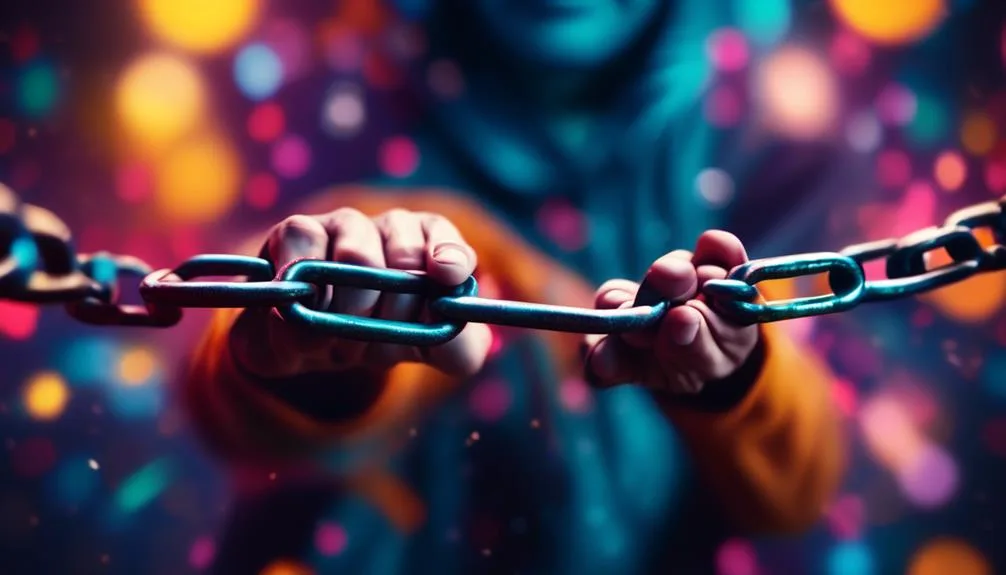Are you tired of feeling trapped in a never-ending cycle of unhelpful coping strategies that seem to do more harm than good? Well, get ready to uncover the truth behind these harmful strategies and discover a path towards freedom and growth.
In this article, we'll explore the definition and impact of maladaptive coping, revealing the hidden dangers that lurk beneath the surface. But that's not all – we'll also delve into specific examples of these strategies and shed light on their origins.
So, if you're ready to break free from the shackles of maladaptive coping and embark on a journey towards healthier alternatives, keep reading. The secrets to unlocking your true potential await.
Key Takeaways
- Maladaptive coping strategies are harmful behaviors that prevent us from effectively dealing with stressful situations and can negatively impact our mental wellbeing.
- Examples of maladaptive coping strategies include substance abuse, rumination, emotional numbing, escape, and intrusive thoughts.
- Negative coping mechanisms for stress and depression include substance abuse, self-harm, avoidance, denial, and isolation.
- Techniques such as mindfulness, cognitive reframing, seeking support, developing healthy habits, and problem-solving can help break maladaptive coping patterns and promote healthier coping strategies.
Definition and Impact of Maladaptive Coping
Maladaptive coping refers to harmful behaviors that prevent individuals from effectively navigating stressful situations, ultimately impacting their mental well-being and social connections. These maladaptive coping strategies can have serious consequences for individuals, both in terms of their emotional health and their relationships with others.
Understanding the causes and consequences of maladaptive coping is crucial in order to address these issues effectively. It's important to recognize that maladaptive coping strategies often develop as a result of overwhelming stress, poor treatment, and emotional invalidation. However, there are effective interventions available to help individuals break free from these harmful patterns.
Techniques such as mindfulness, cognitive reframing, seeking support, developing healthy habits, and problem-solving can all play a role in promoting healthier coping strategies. By addressing maladaptive coping head-on, individuals can start to build resilience and improve their overall well-being.
Examples of Maladaptive Coping Strategies

Now that we have explored the definition and impact of maladaptive coping, let's turn our attention to some examples of harmful coping strategies that can hinder our ability to effectively navigate stressful situations. It is important to recognize these strategies in order to break free from their negative impact on our mental wellbeing.
| Maladaptive Coping Strategy | Impact on Mental Wellbeing |
|---|---|
| Substance abuse | Excessive consumption of alcohol and drugs can lead to addiction and further exacerbate stress and mental health issues. |
| Rumination | Constantly focusing on depressive symptoms and their implications can intensify negative thoughts and emotions, leading to increased distress. |
| Emotional numbing | Shutting down feelings to relieve stress and anxiety may provide temporary relief, but it prevents healthy emotional processing and can lead to emotional detachment. |
| Escape | Changing behavior to avoid difficult situations and feelings can hinder personal growth and prevent the development of effective coping skills. |
| Intrusive thoughts | Unwelcome and upsetting thoughts that are difficult to manage can cause distress and interfere with daily functioning and overall mental wellbeing. |
Understanding these harmful coping strategies can help us identify and address them in our lives. By replacing them with healthier alternatives, such as mindfulness, cognitive reframing, seeking support, developing healthy habits, and problem-solving, we can break free from maladaptive coping patterns and improve our overall mental wellbeing. It is never too late to learn new strategies and cope effectively with stress, even in later stages of life.
Negative Coping Mechanisms for Stress and Depression

When faced with stress and depression, it's common for individuals to resort to negative coping mechanisms that can further exacerbate their emotional well-being.
Self-harm and binge eating are two harmful coping strategies that some people turn to in order to cope with difficult emotions. These strategies may provide a temporary sense of control or numbness, but they can lead to physical and mental health issues in the long run.
Additionally, blaming and self-blaming are cognitive strategies that individuals may use to shift responsibility onto others or themselves. These strategies can contribute to feelings of guilt, shame, and low self-esteem, hindering problem-solving and conflict resolution.
It's important to recognize these negative coping mechanisms and seek healthier alternatives to manage stress and depression effectively.
Techniques to Break Maladaptive Coping Patterns

To break free from harmful coping patterns, it's essential to develop new strategies that promote resilience and well-being. One important technique is self-reflection, which involves examining your thoughts, emotions, and behaviors to gain insight into the underlying causes of maladaptive coping. By understanding why you engage in these patterns, you can begin to challenge and change them.
Additionally, therapy can play a crucial role in breaking maladaptive coping patterns. A therapist can provide guidance, support, and techniques to help you develop healthier coping strategies. They can help you uncover the root causes of your maladaptive coping and provide tools to address them effectively.
With self-reflection and therapy, you can break free from harmful coping patterns and cultivate resilience and well-being.
PositivePsychology.com's Helpful Resources

PositivePsychology.com offers a wide range of helpful resources to support individuals in breaking maladaptive coping patterns and promoting psychological well-being. Coping strategies play a crucial role in our mental health, and having effective strategies is essential for managing stress and maintaining a healthy mindset.
The website provides a wealth of articles, exercises, and tools that are based on scientific research, making them valuable resources for anyone seeking to break free from harmful coping patterns. These resources can help individuals reframe their thinking, develop healthier coping strategies, and ultimately improve their overall well-being.
Furthermore, therapy also plays a significant role in breaking maladaptive coping patterns. Working with a therapist can provide guidance, support, and a safe space to explore and address the underlying issues that contribute to maladaptive coping. Therapy can help individuals develop new coping skills, gain insight into their patterns, and ultimately create positive change in their lives.
PositivePsychology.com's resources and the role of therapy both have the potential to empower individuals and promote their psychological well-being.
Development of Coping Skills

As we explore the development of coping skills, it's important to recognize that these strategies begin to form in early childhood as responses to stress and continue to evolve throughout our lives. Caregivers play a crucial role in shaping these coping skills, as children learn by observing and imitating their caregivers' responses to stress.
The quality of the caregiver-child relationship and the support provided by caregivers significantly impact the development of adaptive coping skills. On the other hand, the long-term consequences of maladaptive coping strategies can be detrimental. These strategies may provide temporary relief from stress, but they fail to address underlying thoughts and concerns, leading to prolonged psychological distress.
It's crucial to foster the development of healthy coping skills from an early age to promote resilience and well-being throughout life.
Frequently Asked Questions
How Can Maladaptive Coping Strategies Impact Our Relationships With Others?
Maladaptive coping strategies can impact relationships by affecting communication and creating trust issues. They may lead to misunderstandings, conflict, and emotional distance. Recognizing and addressing these strategies can help rebuild trust and improve relationship dynamics.
What Are Some Signs That Someone May Be Engaging in Maladaptive Coping Strategies?
If you notice feelings of constant overwhelm, avoiding difficult situations, or relying on harmful behaviors for temporary relief, these may be signs of maladaptive coping strategies. They can negatively impact your mental health and well-being.
Are Maladaptive Coping Strategies More Common in Certain Age Groups?
Maladaptive coping strategies can be found in people of all ages. They have long-term effects on mental health and can be influenced by social media. Recognizing and addressing these strategies is crucial for personal growth and well-being.
Can Maladaptive Coping Strategies Be Unlearned and Replaced With Healthier Alternatives?
Yes, you can unlearn maladaptive coping strategies and replace them with healthier alternatives. By seeking support, practicing mindfulness, reframing negative thoughts, and developing healthy habits, you can break free from harmful patterns and find better ways to cope.
Are There Any Specific Professional Resources or Therapy Approaches That Are Effective in Addressing Maladaptive Coping Strategies?
There are many effective professional resources and therapy approaches available to address maladaptive coping strategies. These resources can provide guidance, support, and tools to help you break free from harmful coping patterns and develop healthier strategies.
Conclusion
So, if you're tired of being stuck in unhelpful patterns and want to break free from maladaptive coping strategies, there's hope.
By understanding the impact of these harmful strategies, recognizing negative coping mechanisms, and implementing practical techniques, you can develop adaptive coping skills.
With PositivePsychology.com's resources and support, you can take control of your coping mechanisms and pave the way for a healthier, more fulfilling life.
Don't wait any longer – unleash your true potential and start your journey towards growth and wellbeing today.

